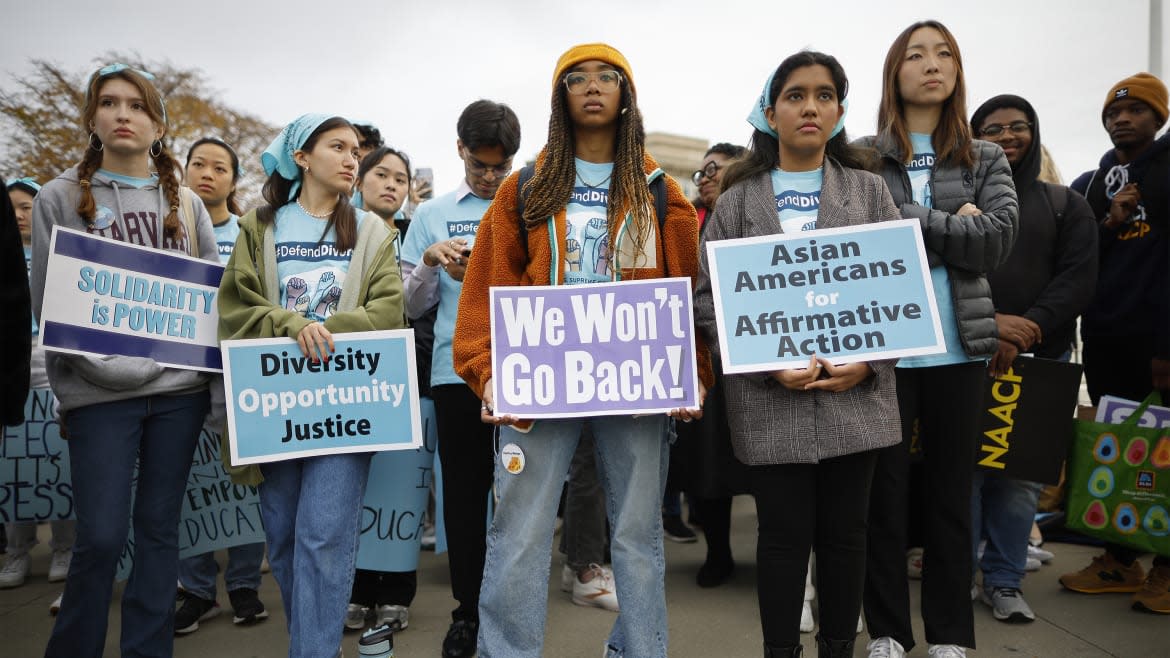Were Asian Americans Forgotten in SCOTUS Arguments Over Affirmative Action?

- Oops!Something went wrong.Please try again later.
In Monday’s five-hour long Supreme Court arguments about the future of affirmative action it was easy to forget that the cases first arose from alleged discrimination against Asian American applicants in the admission processes.
At issue are challenges to the admissions procedures at the University of North Carolina and Harvard that use race among other factors in the goal of seeking a diverse student body. Both universities have defended their policies as compliant with the decades of Supreme Court precedent governing “affirmative action” policies that tried to remedy the history of segregated education first struck down in the landmark decision of Brown v. Board of Education in 1954.
The petitioners, however, claim that Brown’s prohibition of racial segregation means that any admissions policies must be colorblind, meaning no consideration of race would be allowed in making admission decisions.
On Monday, the bulk of the arguments focused on whether the decades-long precedents of allowing race-conscious admissions would be overruled as unconstitutional.
I Was for Affirmative Action, but Now I Think It Should Go Away
As anticipated, extreme conservatives like Justice Clarence Thomas and Samuel Alito made their views plain. Said Thomas: “I’ve heard the word diversity quite a few times, and I don’t have a clue what it means – it seems to mean everything for everyone.”
Alito expressed similar confusion over the term “underrepresented minority,” asking, “What does that mean?” But little time was devoted to such issues as Harvard’s admitted practice of scoring Asian American applicants lower in “personality” than applicants of other races.
Justice Neil Gorsuch brought up the point that some Asian American applicants have been advised to hide their identities in order to improve their chances at getting into highly competitive colleges and universities, to which the Solicitor General of the United States responded that she found such reports “appalling.”
The group that brought the cases, Students for Fair Admissions, also raised the point but spent the majority of the time answering questions about whether it was time to dispense with affirmative action particularly in light of Justice Sandra Day O’Connor’s writing in 2003 that the need for such race-conscious policies would likely be gone within twenty-five years. O’Connor’s optimism seems particularly naïve today with the question of Asian American admissions being a highly controversial issue even among elite high schools like Lowell in San Francisco and Thomas Jefferson in Virginia.
Ironically, Asian Americans have been flagging this kind of prejudice since the 1980s – UC Berkeley apologized in 1989 for admissions policies that caused a decline in Asian undergraduate enrollment – but now a struggle that began in solidarity with other under-represented minorities seems to have pivoted to a position where Asian Americans are often being portrayed as being anti-affirmative action. That is wrong.
Harvard Admissions Data Shows That America Loves Affirmative Action—for Whites
Surveys demonstrate that the majority of Asians favor affirmative action but supporting affirmative action doesn’t mean supporting prejudices like the racist trope that Asians are dull and boring, which seems to be supported by Harvard’s system of giving Asians lower personality scores.
In its defense, Harvard had testified that these scores were justified by the fact that teacher and guidance counselor recommendations for Asian American applicants were not as strong. Assuming that is true, such a fact only demonstrates that stereotypes of Asian Americans are baked into the educational system long before the college admissions process starts.
Of course, a major factor in the cases before the Supreme Court is that the group bringing the cases is spear-headed by conservative activist Edward Blum who was also behind the law suits that curtailed Voting Rights and has previously brought suit over race-based admissions – and lost – over policies at the University of Texas.
There is little doubt that Blum saw an opportunity with Asian Americans to give the newly conservative SCOTUS the opportunity to strike down affirmative action and given the questions Monday there is little doubt that the votes exist to do just that.
Californians’ Vote to Reject Affirmative Action Exposes the Limits of Identity Politics
But one solution did emerge in the back and forth with the Solicitor General who suggested that if the Court determined that the original district court failed to properly apply strict scrutiny to the allegations of improper use of race then the case could be remanded back for further work.
Such a path might give Chief Justice Roberts an argument to prevent another wholesale overturning of precedent and also serve the function of deserved closer review of Harvard’s admissions process. Recall that despite the lower scoring of Asian American applicants, the trial judge found that Harvard had not engaged in intentional discrimination based on the mere fact that Harvard administrators testified that they did not engage in intentional discrimination.
This solution might only delay SCOTUS’s conservative majority appetite for overturning precedent in order to impose their political views but it would also serve to give the judicial system another chance to force a look at what goes into the supposed “holistic” look at Asian American candidates.
Chief Justice Roberts is famous for his statement that the “best way to stop discrimination on basis of race is to stop discriminating on the basis of race.” Sending these cases back to the trial courts for a harder look at how Asian Americans are treated in college admissions would be a good step towards accomplishing that goal.
Get the Daily Beast's biggest scoops and scandals delivered right to your inbox. Sign up now.
Stay informed and gain unlimited access to the Daily Beast's unmatched reporting. Subscribe now.

